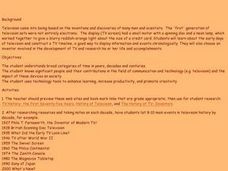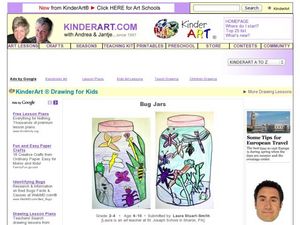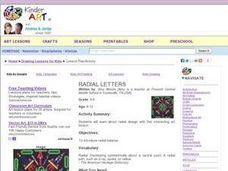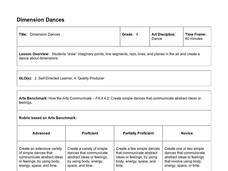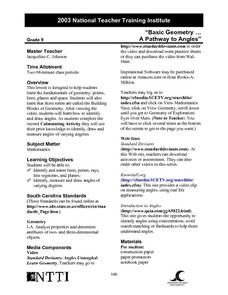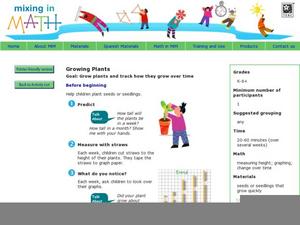Curated OER
Graphics Integrates Fun
Students take digital pictures of themselves before using a stylus pen on to trace their facial features on a graphic pad. Using an Internet gallery of body drawings they complete a caricature of themselves. In two other activities, they...
Curated OER
Hello My Name is . . . Helvetica
Learners play various games to help create a classroom community. In this name recognition lesson, students combine their name recognition skills with newly learned art and geometric vocabulary. First learners discover vocabulary that...
Curated OER
Creating 3-D Shapes in Art
By learning techniques for drawing 3-D shapes, students can create realistic drawings.
Curated OER
Graph it!
Sixth graders view a Stacked Graph, and discuss what it shows. Students discuss the basics of graphing: labels, intervals, legends x and y axis... Students create individual stacked graphs from provided information. Students view a...
National Endowment for the Humanities
Lesson 1: In Depth with the Full Spectrum
High schoolers study the ways in which an artist can use color. They view various images of artwork and discuss the effect of color on spacial dimensions, focal points, tone, and mood.
Curated OER
Zero is Our Hero
Students practice counting sets of items by 10's. In this counting lesson, students create flash cards that show a zero while hiding the first number in order for students to practice counting by 10's. Students practice...
Curated OER
History of Television
Students investigate the history of Television by using the Internet. In this timeline instructional activity, students discuss and take notes on the 10 main events in Television history and create a timeline through education...
Curated OER
The Very Grouchy Ladybug: Telling Time
Students practice telling time by reading a children's story. For this time keeping lesson, students read the book The Very Grouchy Ladybug by Eric Carl, and create a schedule for the ladybug to complete certain activities....
Curated OER
Shape Tool
Pupils explore various polygons and examine how shapes can be manipulated in a variety of ways. In this shape tool instructional activity, students identify geometric shapes in two dimensions. Pupils identify and draw one line of...
Curated OER
Angles and Parallel Lines
Sixth graders draw parallel and intersecting lines to observe and examine the characteristics of alternate interior angles, vertical angles, corresponding angles, and supplementary angles. Through observation, they discover the...
Curated OER
Bug Jars
Students explore symmetry. Students observe a variety of bug and plant drawings, then draw a bug jar. Students observe bugs from the top of the jar for a symmetrical view, and the side of the jar for an asymmetrical view. ...
Curated OER
Expressing Emotions Through Art Lesson 3: Everybody Works Together
Students examine works of art that convey the idea of working together and analyze how artists use foreground, middle ground, and background. They use two-and three-dimensional materials to create a work of art.
Curated OER
Fraction and Decimal Ordering
Ordering numbers just got physical! Learners practice putting numbers in sequence, both in fraction and decimal form. To begin, they line up in birthday order and discuss the difference between ascending and descending. They are then...
Curated OER
Lesson 19: Rational Functions and Long Division
Explore rational functions with this packet. A lot of information is provided, including several examples. Learners graph rational functions and find vertical, horizontal, and oblique asymptotes. This seven-page worksheet contains...
Curated OER
Radial Letters
This art lesson seems simple enough. As a way to introduce radial symmetry, spokes, or rays, learners create an artistic representation demonstrating radial symmetry. They stick a variety of letter stickers on their paper starting in the...
Curated OER
Model Equivalent Fractions: Number Lines or Fraction Strips
In this model equivalent fractions worksheet, students sharpen their problem solving skills as they solve 6 story problems.
Curated OER
Flipping Butterflies: Triadic Colors and Symmetry
Second graders create symmetrical butterfly wings. In this symmetry instructional activity, 2nd graders observe butterfly wings and create their own. They make both sides symmetrical and mix primary colors to make secondary colors.
Hawaiʻi State Department of Education
Dimension Dances
Use dance to help learners conceptualize line segments, rays, lines, and planes. They choreograph dances that show dimensional space. Dancers start by pondering space, point, and lines as the teacher draws them in the air. Each...
Curated OER
Lines of Symmetry
Second graders, in order to recognize symmetrical objects, cut a symmetrical object of their choosing out of construction paper and proceed with the step by step instructions from the teacher. After working on worksheet problems, they...
Curated OER
Basic Geometry ... A Pathway to Angles
Help 9th graders identify lines, points, rays, and planes in geometry. They practice identifying, measuring, and drawing angles of different degrees. This is a fundamental lesson to help students learn the building blocks of geometry.
Exploratorium
Soda Can Mirrors
Here is an entertaining and illuminating lesson on morphed images. Middle schoolers make cylindrical mirrors by wrapping soda cans in reflective mylar. First, they try to determine what the images are that are embedded in the plan by...
Mixing In Math
Mixing in Math: Growing Plants
Whether you have your class plant seeds or begin when sprouts are visible, math skills are used here to predict and track growth over time. Straw bar graphs show plant height on a given day while the graph as a whole shows changes over...
McGraw Hill
My Vocabulary Cards: Grade 4 Math
Practice your fourth grade math concepts with a series of flash cards. Covering topics such as place value, decimals, fractions, measurement, and many more, the flash cards can help learners of any level with their comprehension. The...






